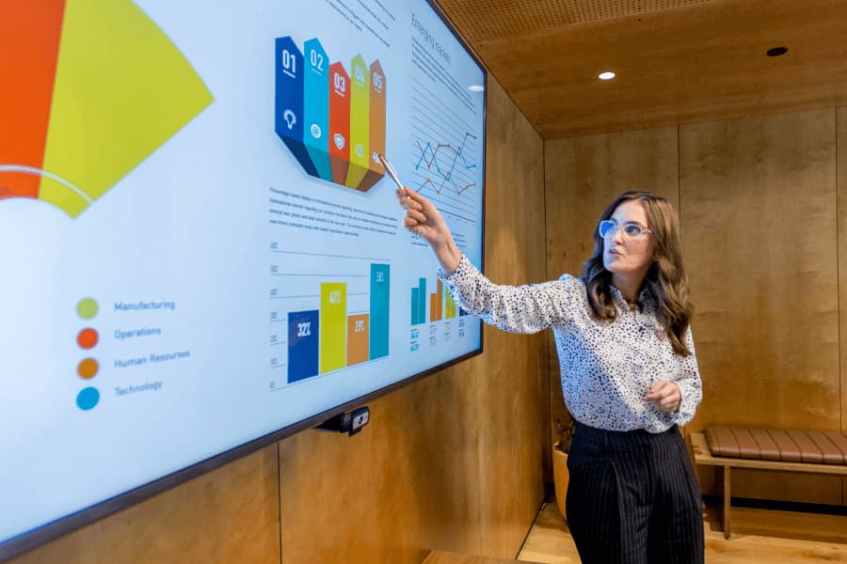Toronto School of Management’s (TSOM) high-quality faculty and programs are dedicated to preparing students for a technologically advanced future.
TSOM Technology programs
The Technology programs at TSOM cater to specific sets of requirements that will help you pursue different roles in the industry. Here is a list of diplomas that you can explore from:
 Diploma in Data Analytics Co-op
Diploma in Data Analytics Co-op
This one-year program, Diploma In Data Analytics Co-op, is powered by AWS Educate, and Tableau. It will help you to develop the in-demand skills and knowledge needed to analyze data and drive decision-making to improve business performance. The program includes 24 weeks of classroom teaching and 12 weeks of co-op work experience.
 Diploma in Cybersecurity Specialist Co-op
Diploma in Cybersecurity Specialist Co-op
This one-year program is ideal for those looking to becoming familiar with all aspects of cyber security such as blockchain, big data and the IoT (Internet of Things). This program is powered by CompTIA, giving you the knowledge to build a solid foundation towards the Security+ certification. The program includes 24 weeks of classroom teaching and 12 weeks of co-op work experience.
TSOM’s Diploma in Cybersecurity Co-op covers the following modules:
1. Introduction to Cybersecurity
This module covers the fundamentals of the cyber-world, including the types of cyberattacks and the principles governing them, properties of the dark net, advanced cybersecurity technology and hackers’ motivations
2. Computer Networks
This module takes students through the structure of personal computer basic concepts in data communications and the seven layers of the Open Systems Interconnection (OSI) model. It also covers the principles of working with Server 2016, remote and direct access and the Virtual Private Network (VPN)
3. Communications, Operating Systems and Data Management
This module breaks down advanced computer communications topics such as operating systems (with a special focus on Linux and Windows) and the monitoring and analysis of network traffic. It also focuses on data archives and management development (Structured Query Language and mobile cybersecurity)
4. Programming Languages for Cybersecurity
This module involves studying basic HTML (Hyper Text Markup Language) and web technologies. Students will also learn about Python code development and basic Python programming.
The module also covers the basics of other programming languages such as Assembly, JavaScript, C and C++, and Hypertext Preprocessor (PHP). An extensive background in cybersecurity programming languages can help students use a combination of language codes for solving any issue
5. Concepts and Practical Implications of Encryption
This module is based on the technology of cryptography and its underlying techniques and limitations. You will also cover the theoretical and practical concepts of the legal issues of cryptography and the different methods available for securing information on computers and networks
6. Information Security in the Cyber-world
This module covers different types of scans for networks, sites and computers to identify vulnerabilities. Students will also discover the various weaknesses in information security and different cyber protection tools and technology.
7. Penetration Testing
This module is designed to provide students with exposure to different penetration testing infrastructure, including equipment required to build and conduct testing. This module will also help learners develop the skills to build effective testing infrastructure
8. Hackathon
The Hackathon module provides expertise for the management and synchronization of multiplayer cyber events on SOC (Security Operation Centers), NOC (Network Operation Centers), MSSP (Managed Security Service Provider) and ISP (Internet Service Providers). It also covers communications strategies to manage and prevent cyberattacks.
The hackathon module improves students’ coding speeds and problem-solving abilities in a limited time. They also learn to collaborate within small teams and brainstorm when faced with new challenges
9. Work Placement
Once these modules are complete, students are required to undergo 240 hours of work placement in a module-appropriate environment. This may include cybersecurity service companies, banking and financial service providers, insurance providers, communications service providers or non-profit and government entities.
Students will get to learn about the practical aspects of the program such as building secure software systems, firewalls and searching for vulnerabilities and risks in different systems or hardware
Why study Information Technology at TSOM?
This IT program aims to provide a strong foundation in this field and cybersecurity, and will help prepare students to earn the prestigious Security+ certification which is industry-recognized. It also offers a well-designed co-op placement module for learners to experience employment within the field.
The school has also partnered with CompTIA, one of the top trade associations in the industry, to provide subject-specific expertise.
TSOM offers the one-year Diploma in Cybersecurity Specialist Co-op program and it’s ideal for students who are preparing for a career in this area and wish to familiarize themselves with related aspects of the subject like blockchain and firewall development.
- Have an Ontario Secondary School Diploma, or equivalent, or be at least 18 years of age and pass the Wonderlic test.
- Successful completion of TSOM EAP Level 4, or
- Have the required IELTS 5.5 score, or equivalent, or
- Pass the TSOM English Assessment (completed on-site or online with an exam invigilator).
For more information on English language requirements, please visit the English Proficiency page.
In order to successfully progress through your studies at TSOM, it’s necessary that each student has access to a personal computer or laptop, with the following minimum configurations:
- CPU:64-bit x86 Intel or AMD Processor from 2011, or later, with full virtualization support with minimum 2GHz or faster core speed. Intel i5 or higher with 4 cores or more is recommended and must support VMware and VirtualBox.
- RAM:6GB or more is recommended.
- Storage:Minimum 256GB HDD/SSD or higher.
- USB3 support.
- Wireless Adapter with N or AC standard.
- Knowledge of tools such as Wireshark, Zenmao, nmap, Burp Suite, Snort, Cryptool, TCPdump, OpenVAS and OSSIM.
- Computer programming skills in languages such as PHP, Python, C++, C, SQL, Hyper-V and other mobile simulating and emulating languages.
- The ability to assess risks to computer systems and networks, and determine how security policies and protocols can be improved.
- Knowledge to anticipate security risks to sensitive information, data, and how to implement new protection mechanisms.
- Learn to uncover and fix flaws in computer systems and networks.
- Thorough knowledge of operating systems and website architecture.
- Soft skills such as leadership, analytical thinking, determination, teamwork, patience and communication skills.
Information Technology diploma courses or IT Security programs are ideal academic gateways to a successful career. According to a Symantec report from 2019, cybersecurity roles will increase by 6 million by the end of 2020. Pursuing the Cybersecurity diploma at TSOM will allow you to take advantage of this tremendous growth.
- Cryptographer:Cryptographers write computer programs and algorithms that encrypt data on computers and external networks to safeguard against cyberattacks. Cryptographers are hired by financial institutions, insurance providers and government agencies.
- Software security engineers:Software security engineers implement and test different security techniques for software. They also troubleshoot and debug security issues that appear during testing and write software code to improve security.
- Security administrators:Security administrators are responsible for ensuring the security of hardware, networks and servers. They install and administer different security solutions and troubleshoot.
- Cybersecurity analysts:Cybersecurity analysts test and evaluate current security measures to check their efficiency in protecting a company’s data. They also write detailed reviews of different risks and vulnerabilities they find in current cybersecurity systems to improve them.
It’s easy to apply for the Diploma in Cybersecurity Specialist Co-op at TSOM – get in touch with a student advisor via phone or email and get all your questions answered. The student advisor will also guide you through the enrollment process.
The Diploma in Cybersecurity Specialist Co-op is open for student admission four times in the academic. For complete list of start dates visit the page here.
You can pay the admission and tuition fees through online payment channels, bank wire transfer, debit or credit card transactions or money order.
How long is the Diploma in Cybersecurity Specialist Co-op at TSOM?
The program consists of a total of 51 weeks, including scheduled breaks or one academic year. This is further subdivided into 24 weeks of in-class instruction and 12 weeks of a co-op placement.
When can I enroll on the Information Technology diploma and when are classes held?
The program is open for student admission four times in the academic. All classes are held during the day.
How will my work be assessed?
The entire curriculum is divided into eight academic courses and one work placement course. For courses 1-7, individual assignments and class tests make up 50% of the final grade, the final exam accounts for 40%, and 10% is reserved for participation.
For course 8, individual assignments and class tests make up 50% of the final grade and 10% is reserved for participation. The work placement report will be either assessed as simply a ‘pass’ or a ‘fail’.
If you fail to pass a specific course, you have the option of re-taking it next year with an additional fee.
Testimonials














